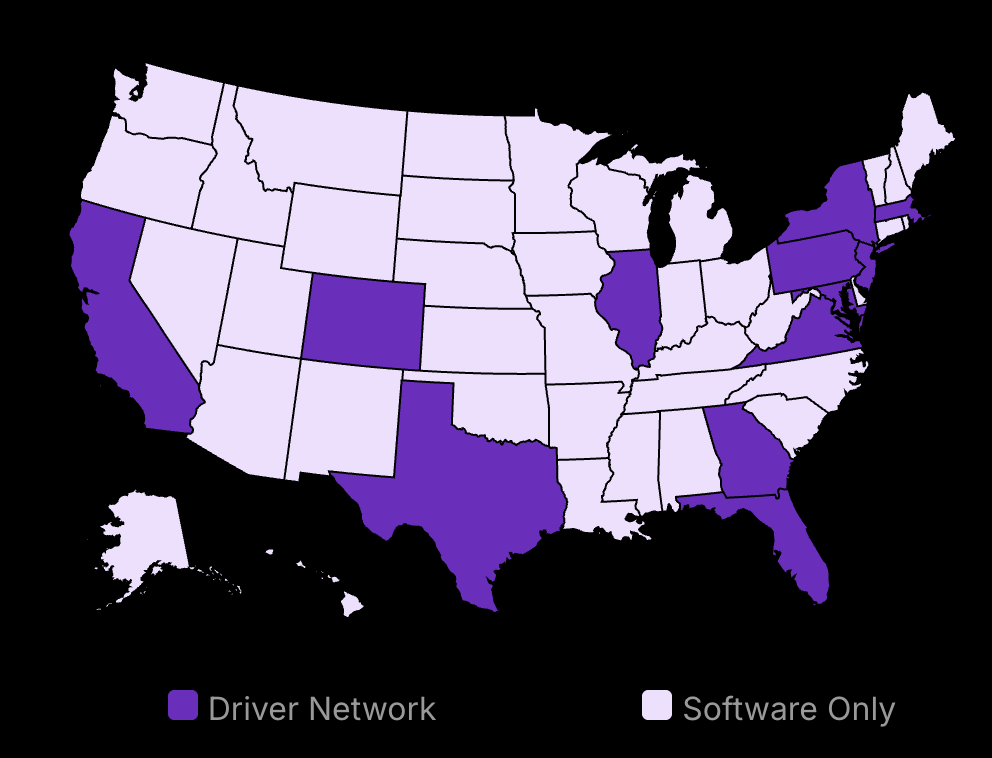Entrepreneur or Small Business Owner: Are you running a business or chasing a dream?
This question isn’t just philosophical. It’s practical. It shapes how you work, grow, and measure success. Many people use “entrepreneur” and “small business owner” interchangeably. But they’re not the same.
I’ve been both. And the difference is stark.
Let’s explore what sets these roles apart. We’ll look at mindsets, goals, and daily realities. By the end, you’ll know which label fits you best. And more importantly, why it matters.

Save 80% of delivery management time
We handle everything:
- Dedicated operations manager
- Real-time tracking dashboard
- Automated customer notifications
- Urgent issue resolution
Distinguishing Your Role: Are You a Small Business Owner or an Entrepreneur?
Know the focus. Small business owners cater more to local markets. Entrepreneurs strive for big growth.
Consider risk. Small business owners often play it safe. Entrepreneurs take big risks.
Understand priorities. Stability appeals to small business owners. Innovation drives entrepreneurs.
Defining Small Business Owners
Small business owners usually cater to local markets. They’re often deeply engaged in their communities. You might see them participating in local events or supporting other businesses in the area. The main goal for many business owners is to provide a stable and reliable service or product. They value consistency over constant change. They’re not always looking to revolutionize their field but rather to maintain a steady business with loyal customers. Discover the top small business ideas that promise high profitability, offering a guide to establish a steady and successful local business with a devoted customer base.
Many small business owners prefer stability. They may not emphasize rapid growth. They focus on the sustainability of their operations. This doesn’t mean they lack ambition. Instead, their ambition might be to become a cornerstone of the local community. They want to be known for quality and service. It’s a classic approach, seen in many local shops or service providers who have served communities for years.
Characteristics of Entrepreneurs
Entrepreneurs focus on innovation. They look beyond local markets. They’re not merely improving existing products or services; they’re dreaming up new ones. To facilitate this, many utilize open innovation software to collaborate with external partners and streamline the development of groundbreaking ideas. Look at examples like Elon Musk with Tesla and SpaceX. They focus on solving big problems, not just for their neighborhood but for the world. Discover the crucial errors to steer clear of as a budding entrepreneur.
Risk-taking defines entrepreneurs. They face the possibility of failure head-on. Why? Because high risk can also bring high rewards. Entrepreneurs are often willing to gamble on their vision in a way that’s beyond the comfort zone of small business owners. Think of someone starting a tech firm with an untested but innovative idea. They are challenging existing market norms.
Entrepreneurs have a global vision. They’re not restricted to local growth. They aim to penetrate wider markets. Consider tech giants like Apple or Amazon, who started small but now dominate global markets. Their ethos is to always keep moving forward, even when the path isn’t clear.
Key Differences Between Entrepreneurs and Small Business Owners
Entrepreneurs face and embrace bigger risks.
Small business owners lean toward safety.
Entrepreneurs target quick scale and reach.
Small business owners aim for secure growth.
Risk Tolerance
Entrepreneurs are risk-friendly. They often align their identity with risk-taking. Mark Zuckerberg famously said, “The biggest risk is not taking any risk.” This highlights a mindset that accepts potential failure as part of the growth process. Entrepreneurs expect setbacks, and they learn resilience through failure. They prefer incorporated businesses that set a clear line between personal and business liabilities. This distinction emboldens them to think bigger, beyond immediate fears. Entrepreneurs chase after what seems impossible without hesitation. They know achieving groundbreaking success often involves weathering many storms.
Small business owners, in contrast, are more conservative in their thinking. They manage unincorporated businesses, exposing personal assets. This setup influences their risk decisions, as a bad call can impact them directly. These small business owners focus on and prefer sustainable strategies that keep operations afloat. A measured approach keeps challenges manageable. They aim for steady revenue and shy away from the kinds of risks that entrepreneurs often take.
Growth Ambitions
Founders of big ventures don’t just want to run a business; they want to grow it big and fast. Their goal is to keep moving the finish line forward. Reid Hoffman’s observation, “The fastest way to change yourself is to hang out with people who are already the way you want to be,” speaks to the drive behind their ambition. It’s not about maintaining a current or status quo; it’s about achieving the next milestone as quickly as possible. They plunge into new industries, often pushing beyond traditional growth limits. Innovation and scalability push them forward, creating success stories from scratch, like tech giants and market disruptors.
“Small business owners tend to take a different path by focusing on local strength. They appreciate steady success and consistent low-risk returns. Their journey is more about holding their ground for long-term benefits. Their focus aligns with achieving stable, manageable growth year over year. They aim for a slow and solid ascent rather than a shoot-for-the-moon strategy. Building solid relationships within the community is often more rewarding for them than global market reach. This nurtures a loyal customer base that values consistency and local engagement over rapid changes.
Operational Approach
Innovation defines the entrepreneurial path. Entrepreneurs enjoy breaking norms and embracing new ideas. They don’t seek permission; they make ways to shape industries. “The best way to predict the future is to create it,” says Peter Drucker. This sums up their need to set trends rather than follow them. This proactive mindset encourages experimenting with untried strategies. They focus on restructuring models to align with future demands, even if it means multiple failures along the way. This approach disrupts but also garners success by addressing unmet needs.
Contrarily, small business owners stick with tried-and-true strategies. They don’t need to reinvent the wheel if the current one works just fine. This position often fits their business ownership style perfectly, ensuring profits and mitigating loss. Jeff Bezos stated, “If you don’t understand the details of your business you are going to fail,” which aligns with their detail-oriented management. They value success in proven methodologies, preferring effective models over experimental ones. Their decision-making leans toward enhancing operational effectiveness rather than speculative innovation. While they don’t rule out growth, they are inclined to expand cautiously by leveraging their existing strengths.
Traits of Successful Entrepreneurs: Do You Share These Qualities?
Visionary Thinking
Entrepreneurs with visionary thinking don’t wait to react; they anticipate. They predict shifts in the market. This forward-looking approach enables them to create products or services before demands emerge visibly.
Visionary entrepreneurs often lead with innovation. Their ability to articulate a clear vision helps them secure buy-in from stakeholders many employees and investors. They don’t just set goals; they generate a compelling narrative that explains why those goals matter.
Adaptability and Resilience
Entrepreneurs excel at evolving with the new business environment. Being adaptable means not just enduring change but leveraging it for growth. They pivot strategies when needed and aren’t wedded to a single plan.
Resilient entrepreneurs view setbacks as stepping stones rather than stumbling blocks. They analyze failures, glean insights, and adjust accordingly to ensure future success. The ability to transform challenges into learning opportunities sets successful entrepreneurs apart from other executives.
Passion and Commitment
Passion engages many entrepreneurs deeply with their ventures. It’s an intrinsic motivation that propels them through hurdles. Passionate entrepreneurs tend to throw themselves into their work, often dedicating long hours and personal resources to achieve their visions.
Commitment entails a steadfast dedication to one’s goals and a willingness to persevere through challenges. Entrepreneurs invest personally in their ventures, tapping into an inexhaustible well of motivation.
Risk Tolerance
Successful entrepreneurs tend to develop a keen tolerance for risk, making decisions in uncertain situations. They are strategic risk-takers, knowing when a gamble might pay off.
Understanding the balance between risk and reward in launch ventures is crucial. Entrepreneurs often calculate normal financial risks and potential outcomes meticulously before stepping into unknown territory.
Self-Awareness and Team Building
Self-awareness empowers entrepreneurs to exploit their strengths and compensate for weaknesses. It involves an honest appraisal of one’s capabilities and an openness to improvement. By identifying gaps and acknowledging limitations, entrepreneurs can align themselves with complementary team members.
An effective team enhances the whole, not an entrepreneur’s vision, filling in gaps where skills might be lacking. Building such a team requires intentionality in hiring and developing talent. Successful entrepreneurs understand the value of diverse teams and seek out perspectives that challenge their own.
Challenges Faced by Small Business Owners and How to Overcome Them
Knowing how to manage your money is crucial.
Standing out is essential in a crowded market.
Balancing tasks and delegating leads to better management.
Financial Management
Managing money is a big deal for small business owners. A solid 50% of small businesses face cash flow challenges. This can lead to cutting back on spending and sometimes missing out on opportunities.
Cash Flow and Budgeting
Understand Cash Flow: Create a cash flow statement. This shows money coming in and going out. Spot any potential issues early.
Build Cash Reserves: Aim for more than 4.26 months in reserves, as this is the average. This prepares the business for unexpected expenses.
Create a Budget: Not having a budget can harm your business. Write down all income and expenses. Stick to it. This helps prevent overspending.
Explore Funding Options: If you have trouble getting loans, consider alternatives. Crowdfunding and small business loan programs can help.
Tax Compliance:
Hire a Tax Professional: Most small businesses might overpay taxes. A tax pro can check your returns and save money.
Use Tax Software: It makes filing easier and checks for deductions. The software reduces compliance costs, especially for businesses earning under $1 million.
Competition and Market Saturation
Standing out is tough in crowded markets. The right moves can make your product or service shine.
Differentiation Strategies:
Unique Selling Proposition (USP): Define what makes your product or service different. Write down your USP. Share it with your team and customers.
Market Research: Know your competitors. Study their prices, quality, and service. Figure out where you can offer something better.
Customer Feedback: Use surveys to understand what customers want. Improve your offerings based on this feedback.
Brand Positioning: Clarify your brand message. Make sure it aligns with your target market’s needs and values.
Use tools like SWOT analysis to look at strengths, weaknesses, opportunities, and threats.
Online Presence: Build a strong website and use social media. It helps reach a wider audience.
Local Partnerships: Collaborate with local businesses. This can increase your exposure and customer base.
Balancing Business Operations
Small business owners often wear many hats. This can lead to burnout if not managed well.
Delegating Tasks
Identify Key Areas: List your daily tasks. Figure out which ones can be handed off.
Hire Smart: Look for employees who fill your skill gaps. They should be reliable and add value to your team.
Train and Trust: Once you hire, train them thoroughly. Trust your employees to handle the tasks.
Use Technology: Streamline operations with tech tools. This includes software for accounting, customer management, and communication.
Building a Capable Team
Team Meetings: Hold regular meetings to align on goals. This keeps everyone on the same page.
Culture of Openness: Encourage communication. Employees should feel comfortable sharing ideas and concerns.
Transitioning from Small Business Owner to Entrepreneur: Steps to Take
Growth starts with finding the right opportunities.
Make your business model ready for growth by using tech and automating things.
Build leadership skills to guide your team toward new ideas.
Identifying Growth Opportunities
Finding ways to grow means knowing where your own business stands now. You look at what you already have and see if there is room to grow. Do a deep analysis of your strengths, weaknesses, and what could be better.
You can begin by evaluating your current place in the market. It is better to check your share relative to competitors. Understand customer needs through surveys and direct feedback. You can determine which products or services drive the most profit. This analysis helps in spotting gaps or niches your business can fill.
Building a Scalable Business Model
A scalable business model means the ability to handle more sales without increasing costs too much. Focus on refining processes and using technology to automate operations.
Revisit your processes to support more volume. Streamline customer service, supply chain, and inventory management. This ensures you can handle growth without sacrificing quality. Plan for resources that may be stretched, such as staffing or capital needs, when scaling up.
Embrace technology to make tasks easier. CRM systems can automate customer management, while ERP systems can integrate all business processes. Research and compare tools to find what fits your industry. Automation reduces manual tasks and frees up team members for strategic tasks.
Strengthening Leadership Skills
As your business grows, your role as a leader changes. Cultivating strong leadership skills is vital for guiding your team’s successful company through growth phases.
Leadership involves making quick, informed decisions. Learn to analyze situations with incomplete info and choose the best course of action under uncertainty. Crisis management includes being prepared for sudden changes and mitigating risks effectively. Training courses or workshops on decision-making can be beneficial.
Think beyond daily operations and plan for the future. It is better to consider where you want the business to be in 5 or 10 years. Develop plans to achieve this vision and communicate it clearly to your team. Being a visionary means setting ambitious goals and adapting to new trends or technologies. Encourage innovation and reward team members for bringing fresh ideas.
As you transition, remember that more than 40% of traditionally employed Americans are eyeing entrepreneurship, highlighting the rewards and challenges of this journey (TeamStage). Transitioning to an entrepreneur involves careful planning and adjustments. This sets the stage to grasp the nuances of being a business person, entrepreneur, or small business owner next.
Understanding Terminology: Business Person, Entrepreneur, and Small Business Owner
Business Person
Primarily, a business person thrives within the realm of established strategies and frameworks. Their goal often centers on maximizing efficiency and profitability within a structured corporate environment. This role is integral to maintaining and optimizing operations. Unlike other entrepreneurs and business owners who might chase novelty, business people dictate how to apply known tactics for achieving organizational objectives. Dive into the realm of entrepreneurship by exploring the most lucrative small business ventures to initiate, providing you with strategic insights and guidance to flourish in your entrepreneurial journey.
For this group, the endgame is not necessarily innovation but rather perfecting the art of business operations, ensuring consistency of execution. They often gravitate towards managerial or executive roles offering jobs where they can implement systems effectively. If you’re digging deeper, consider examining classic text on business sense, like “Business Model Generation” by Alexander Osterwalder, which discusses frameworks within which business people operate.
Responding to the often-asked question, “What is the difference between a businessman and someone, not an entrepreneur or intrapreneur?” reveals that a business person might adhere to the existing business and systems, while an intrapreneur acts like an entrepreneur within a company, driving innovation without the risks inherent to independent ventures.
Entrepreneur: A Broad Perspective
An entrepreneur is someone who launches and cultivates new businesses and endeavors, often bringing transformative ideas to life. They differ from traditional business persons by not just operating within existing structures but by creating new pathways and opportunities where none previously existed. This role requires a deeper understanding of market needs, creative thinking, and a propensity to take risks. While a business person might excel in optimizing current processes, many entrepreneurs see what could be and strive to achieve it.
Entrepreneurs are unafraid of the unknown. They readily adopt new technologies and trends, continuously exploring diverse fields to innovate solutions. The distinction between an entrepreneur and a business person becomes clear when considering the size and scope of the impact. Entrepreneurs often target broader markets and may “scale” their enterprises to a global level.
Small Business Owner: A Community-Centric Role
The small business owner holds a distinct place. Unlike the entrepreneur or large corporation who might yearn for scale, a small business owner often values stability and strong community ties. Focused on steady operations, these store owners say they ensure their business positively impacts local economies. Their operational style includes deep engagement with community interests and maintaining reliability over expansive growth.
Small business owners cater to local needs, sometimes making them local “staples” or champions of niche markets. They usually prefer to reinvest profits into the community rather than broadening business horizons.
Conclusion: Entrepreneur or Small Business Owner?
Entrepreneurs and small business owners share common ground but differ in key areas. Our analysis reveals distinct characteristics:
Risk appetite: Entrepreneurs embrace higher risks for potential rewards.
Growth focus: Entrepreneurs aim for rapid expansion, while small business owners prioritize local stability.
Innovation: Entrepreneurs often disrupt markets; small business owners rely on proven methods.
Successful entrepreneurs typically display:
Visionary thinking
Adaptability
Unwavering commitment
Small business owners face unique challenges:
Financial management
Market competition
Balancing multiple roles
Transitioning from small business owner to entrepreneur requires:
Identifying growth opportunities
Building scalable models
Enhancing leadership skills
We found that neither role is superior. Your true identity depends on your goals and risk tolerance. For local impact and stability, embrace the small business owner role. For innovation and rapid growth, the entrepreneurial path may be your calling.



























